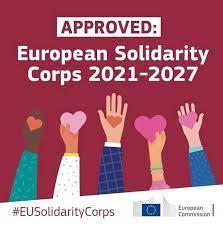
The 2021-2027 European Solidarity Corps (worth more than one billion euro) will be a significant upgrade in the value it provides for volunteers compared with previous iterations of the programme. The new Corps features improvements to the insurance policy and health and safety guarantees covered by the programme, as well as increased requirements for hosts to ensure a meaningful learning experience for participants.
It is also more inclusive than its predecessor: the Commission and member states will have to present plans to increase the participation of young people who have been exposed to structural disadvantages as compared to their peers and who could not take part in the programme in the past. A significant change to this end is that young people, and in particular those with fewer opportunities, will be able to volunteer in their own country. Additional financial support and support measures, such as general and language training, insurance, and administrative assistance, will be made available to better cater for the specific needs of those with fewer opportunities.
More meaningful learning experience
Projects that will receive EU funding to host volunteers will undergo a more rigorous authorisation process to prove the quality of the volunteering activities focussing on learning, gaining skills and competences. Projects will also have to comply with occupational health and safety regulations as well as the “do no harm” principle, in line with the European Green deal. Additionally, projects will be encouraged by the programme to contribute to the EU’s climate objectives, such as choosing climate-neutral transportation in their project implementation.
More value to communities
During the negotiations with Council, MEPs insisted programmes must prove they contribute to positive societal change in local communities. Special clearance will be needed for volunteers working with children and people with disabilities.
Special rules for humanitarian aid volunteers
Due to the specific challenges and the need for qualified experts within the humanitarian aid strand of the programme (making up 6% of the programme), the age limit for those participating will be 35 years. There will be no age limit for volunteering experts and coaches.
Quote
“Volunteering is a true form of solidarity and is at the heart of our EU values. Our new programme is more focused and offers so much more to young people in Europe. Volunteering is a vital part of our modern democracy. We will be able to overcome this crisis together if we increase our civic engagement”, said the rapporteur Michaela Šojdrova (EPP, CZ).
Next steps
In order to ensure a smooth transition from the previous programme period, retroactivity provisions in the regulation ensure that the new European Solidarity Corps enters into effect from 1 January 2021.
The Commission launched today the first call for proposals under the new European Solidarity Corps 2021-2027.
With a dedicated budget of €1.009 billion for 2021-2027, the new European Solidarity Corps programme will offer opportunities to at least 270,000 young people to help address societal and humanitarian challenges through volunteering or by setting up their own solidarity projects. For the first year of action, more than €138 million are available. The first annual work programme and the Programme Guide 2021 have also been published.
The call covers volunteering projects, volunteering teams in high priority areas, solidarity projects, quality label for solidarity volunteering activities and quality label for humanitarian aid volunteering. Deadlines for submission of applications are 28 May and 5 October. Applications for the quality label for solidarity volunteering can be submitted on a continuous basis. Deadline for applications for the quality label for humanitarian aid volunteering is 22 September.
The new European Solidarity Corps supports the political priorities of the European Union and engages organisations and young people in projects to address them. The programme promotes inclusion and diversity, aims to incorporate green practices in projects and encourages environmentally sustainable and responsible behaviour among participants and participating organisations. It supports the digital transition through projects and activities that boost digital skills and fosters digital literacy. The programme also promotes participation of young people in democratic processes and civic engagement. In addition, the new programme has the flexibility to add annual priorities addressing pressing issues. This year’s additional thematic area is health. The programme will mobilise young people in projects addressing health challenges, including the impact of the COVID-19 pandemic, and recovery.
Background
The European Solidarity Corps for 2021-2027 will for the first time be a stand-alone volunteering programme with its own budget (activities covered by the programme were previously covered by the 'Youth' section of Erasmus+ as well as the “EU Aid Volunteers” programme).
Anyone between 18 and 30 years of age can apply to volunteer for between two and twelve months in any EU country, as well as in Iceland, North Macedonia, Turkey and Liechtenstein which take part in the programme. Projects in participant partners can also host volunteers from all EU neighbouring countries (more here). The UK has decided not to participate in any EU-funded exchange programmes, including the Solidarity Corps.
Volunteers do not receive payment for the work they do. However, they receive money to pay for travel costs to and from the project, accommodation, meals, medical insurance and a small amount to cover day-to-day living expenses.










Add new comment